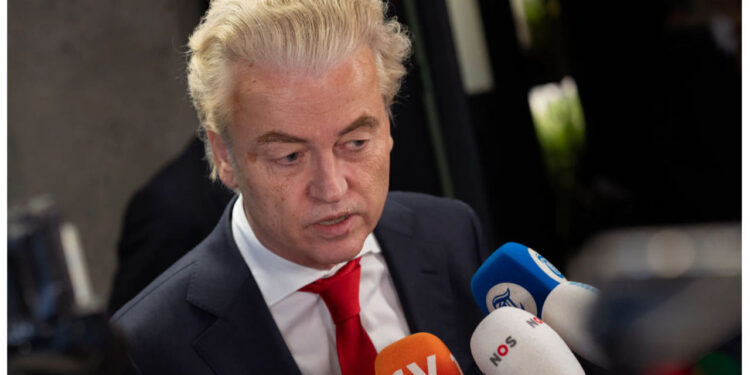Anti-Islamic firebrand Geert Wilders and three other party leaders reached an agreement on a coalition arrangement early Thursday that shifts the Netherlands to the far right, concluding a tortuous half-year of discussions that left it uncertain who would become prime minister.
The “Hope, Courage, and Pride” pact imposes stringent restrictions on asylum applicants, eliminates family reunion for refugees, and aims to minimize the number of international students studying in the country.
“Deport people without valid residence permits as much as possible, even forcibly,” the 26-page paper states.
“We are writing history today,” Wilders declared, claiming that he had ensured that the three other coalition parties, including outgoing Prime Minister Mark Rutte’s, had agreed to the heart of his platform.
“The sun will shine again in the Netherlands,” Wilders declared. “It is the strongest asylum policy ever.”
With hard-right and populist parties already in or controlling a half-dozen governments throughout the 27-nation European Union, they appear poised to gain ground in the bloc’s June 6–9 election. Wilders has supported radical right and populist leaders, including Hungarian Prime Minister Viktor Orbán, Italian Prime Minister Georgia Meloni, and French opposition leader Marine Le Pen.
“My party will be at the heart of power. “It makes us extremely proud,” Wilders stated.
He had to make personal sacrifices, however. Wilders has already admitted, reluctantly, that he will not succeed Rutte as prime minister. The parties have yet to agree on a prime minister, who is believed to be a technocrat from outside the party structures.
Speculation has centered on Ronald Plasterk of the Labour Party, who rose to prominence this year as the first “scout” to hold talks with party leaders about potential alliances.
According to the agreement, the new government would continue to fund a climate change fund established last year as well as other existing climate change measures. However, the Farmers Citizens Movement is a member of the coalition, and the agreement includes soothing language and concessions to farmers who have blockaded cities with tractors during disruptive protests.
Other provisions of the accord include increased social housing, harsher penalties for significant offenses, and a cap on property taxes.
The organization intends to continue its support for Ukraine and hopes to meet the NATO benchmark of spending 2% of GDP on defense legislation.
EU headquarters may not appreciate a paragraph in the coalition agreement that states, “The Netherlands is very critical against further enlargement of the European Union,” at a time when many other member countries seek to include Ukraine and other eastern nations. Before adding more nations, the EU must achieve consensus among its current members.
The parties will outline the agenda for parliament on Thursday, but there will be no debate on the deal until next week.










